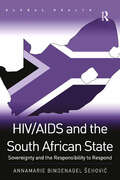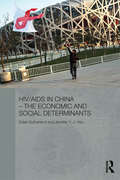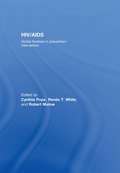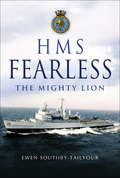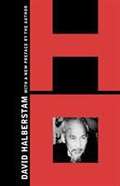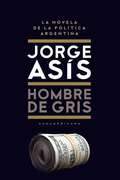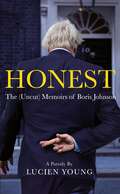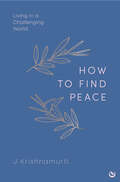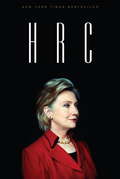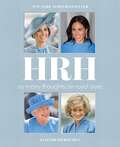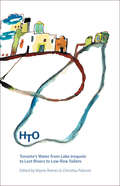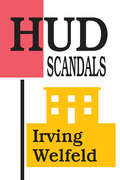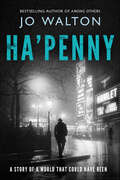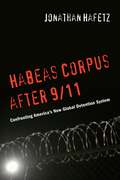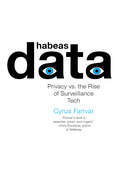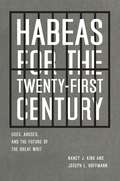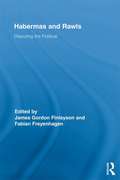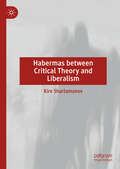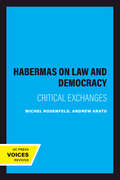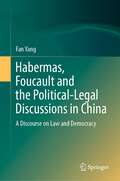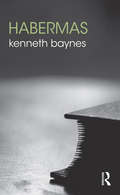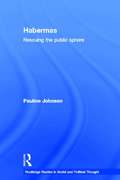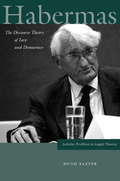- Table View
- List View
HIV/AIDS and the South African State: Sovereignty and the Responsibility to Respond (Global Health)
by Annamarie Bindenagel ŠehovićFor three decades post-apartheid, the HIV/AIDS epidemic from first acknowledgement to its management as a chronic disease, demanded unparalleled attention. This was nowhere more evident than in South Africa. This book explores how the state responded to its responsibilities to defend and protect (human) security. Linking this to the role of the state as sovereign protector and provider of security, it applies the findings to the broader re-interpretation of sovereign responsibility in the 21st Century. This book does not seek to absolve the South African state of its responsibility to respond. Moreover, it argues that although the state, the government, before, during, and after the transition to democracy, was aware of and acknowledged the threat - political, economic and social - posed by the epidemic, it nonetheless chose not to make the epidemic a priority policy issue. As a result, it argues that the South African HIV/AIDS case illustrates the tension inherent between a state’s ultimate sovereign responsibility to respond and its tactical dependence on external contributors to meet the demands of all of its constituents.
HIV/AIDS in China - The Economic and Social Determinants: The Economic And Social Determinants (Routledge Contemporary China Series)
by Jennifer Y.J. Hsu Dylan SutherlandSouth and East Asia may well become the epicentres of the global HIV/AIDS pandemic. More than three-quarters of a million people are now estimated to be living with HIV/AIDS in China. In 2009, AIDS had already become the leading cause of death by infectious disease. Yet, even despite China’s recent economic and social progress, a number of development issues - not least the emergence of glaring inequalities - have also emerged. The expansion of the HIV/AIDS epidemic is also an important longer term development challenge. This book analyses China’s HIV/AIDS epidemic, with particular attention to the nature and impact of current economic and social changes and how these changes may be driving the epidemic. It examines aspects of income and gender inequality; rural-urban migration; commercial sex work; healthcare and civil society organizations. Health care reforms and the role of NGOs are also considered as well as general government policy. Overall, this book provides a full discussion of the most critical aspects of the current HIV/AIDS situation in China and its impact on Chinese society.
HIV/AIDS: Global Frontiers In Prevention/intervention
by Cynthia Pope Renee T. White Robert MalowHIV/AIDS: Global Frontiers in Prevention/Intervention provides a comprehensive overview of the global HIV/AIDS epidemic. The unique anthology addresses cutting-edge issues in HIV/AIDS research, policymaking, and advocacy. Key features include: · Nine original essays from leading scholars in public health, epidemiology, and social and behavioral sciences · Comprehensive information for individuals with varying degrees of knowledge, particularly regarding methodological and theoretical perspectives · A look into the future progression of HIV transmission and scholarly research HIV/AIDS: Global Frontiers in Prevention/Intervention is will serve as a precious resource as a textbook and reference for the university classroom, libraries, and researchers
HMS Fearless: The Mighty Lion 1965-2002: A Biography Of A Warship And Her Ship's Company
by Ewen Southby-TailyourThe Seventh ship to bear the name, the Assault Ship and Commando Carrier HMS Fearless was first commissioned in 1965. Over the next 37 years she was seldom far from the actions in which British forces were engaged world-wide, be they in Aden, Malaysia and Borneo, Northern Ireland, the Cold War (Norway), South Rhodesia, Falklands, the Gulf, Afghanistan and so on. Thousands of sailors, Royal Marines and soldiers served on board over her 19 commissions. Now paid off, Fearless has a great story to tell and the Author, a former senior Royal Marine who knows her well, is superbly qualified to tell it.
HO
by David HalberstamOne of the most influential leaders of the twentieth century, Ho Chi Minh was founder of the Indochina Communist Party and its successor, the Viet-Minh, and was president from 1945 to 1969 of the Democratic Republic of Vietnam (North Vietnam). In exploring the life and career of Ho Chi Minh, Pulitzer Prize-winning author David Halberstam provides a window into traditions and culture that influenced the American war in Vietnam, while highlighting the importance of nationalism in determining the war's outcome. As depicted by Halberstam, Ho is first and foremost a nationalist and a patriot. He was also, according to the author, a pragmatist "who was able to turn the abstract into the practical and to embody the concept of revolution to his own people." This edition includes a new preface by the author.
HOMBRE DE GRIS (EBOOK)
by Jorge AsisEste libro representa no sólo el regreso de Jorge Asís a la novela política, sino que también inaugura una trilogía que continuará con Tulipanes salvajes en agua de rosas y Casa casta. Asís nos ha hecho esperar más de una década para leer, al fin, la gran novela de la política argentina de los últimos años. Con su inigualable capacidad para el retrato, la descripción furiosa y la metáfora urticante, el autor de Flores robadas en los jardines de Quilmes cuenta la historia del gobernador Arredondo y su círculo de participantes de vueltos, operadores políticos y mediáticos, todosterrenos, un cuñado, un caído en desgracia que quiso ser presidente, cretinos que calumnian, peronistas estructurales, radicales perennes, obstinados menemistas transformados en graves consumidores de anchoas en el desierto, ex mujeres y progresistas de digestión tardía, entre otros protagonistas de esta gran aventura. El Hombre de Gris ha nacido en una provincia que podría haber sido La Rioja, Formosa, Jujuy o Santa Cruz, pero se llama San Patricio. De allí saldrá el hombre que debe salvar a la Argentina. Observador certero y narrador astuto, Jorge Asís demuestra una vez más con esta novela que es uno de los autores más notables de la narrativa argentina actual.
HONEST: The (Uncut) Memoirs of Boris Johnson
by Lucien Young*The memoirs of Boris Johnson, complete and unabridged, including all the great material he had to take out for being either too incendiary or too obviously made up*Ghostwritten by Lucien Young, while Boris was sunbathing on a donor's private island.Offering a comprehensive account of his meteoric rise (and even more meteoric fall) we follow Boris from Eton and the Bullingdon club, via stints in journalism and as London mayor, before finally making it into Number 10 via slick and sophisticated campaign tactics such as lying and hiding in a fridge. It will outline in bonce-combusting detail the up and downs - but mostly ups! - of his tenure in Downing Street, from Getting Brexit Done and battling the Wizards of Woke, to nearly dying because he shook too many hands. This is BoJo as you've never seen him before.
HONEST: The (Uncut) Memoirs of Boris Johnson
by Lucien Young*The memoirs of Boris Johnson, complete and unabridged, including all the great material he had to take out for being either too incendiary or too obviously made up*Ghostwritten by Lucien Young, while Boris was sunbathing on a donor's private island.Offering a comprehensive account of his meteoric rise (and even more meteoric fall) we follow Boris from Eton and the Bullingdon club, via stints in journalism and as London mayor, before finally making it into Number 10 via slick and sophisticated campaign tactics such as lying and hiding in a fridge. It will outline in bonce-combusting detail the up and downs - but mostly ups! - of his tenure in Downing Street, from Getting Brexit Done and battling the Wizards of Woke, to nearly dying because he shook too many hands. This is BoJo as you've never seen him before.
HOW TO FIND PEACE: Living in a Challenging World
by Jiddu KrishnamurtiPreviously unpublished - This is a collection of Krishnamurti's speeches and informal talks where he discusses war, politics and global tensions. It's especially vital in these times where people are overwhelmed by bad news and discord on all sides.On its 40th anniversary, Krishnamurti was invited to speak to the United Nations. He was then 90 years old, and they used the opportunity to give him a peace medal. The editors at the Krishnamurti Foundation of America were then requested to add more content from various recorded talks to create a book to be distributed by the World Future Society. The book was given out for free at their convention in Washington DC in 1992 but other than that it has never been published. The location of the talks transcribed ranges from Brussels to Mumbai, and from San Diego to Colombo.We are accustomed to Krishnamurti giving guidance on meditation, on inner states and qualities of the mind, but not so much on the world, on how we might live and on how to act in a world torn by conflict and by perceived decline and degradation. What can we do? How should we act? These extracts from talks, speeches and other books will help us feel better when we feel overwhelmed and encourage us to do what is within our power to make things better. Audiences are desperate for some constructive good news in these confusing and troubling times; there are no simple answers and Krishnamurti would never offer these anyway, but this is like sitting round the fire with a trusted elder.
HRC
by Jonathan Allen Amie ParnesThe mesmerizing story of Hillary Clinton's political rebirth, based on eyewitness accounts from deep inside her inner circleHillary Clinton's surprising defeat in the 2008 Democratic primary brought her to the nadir of her political career, vanquished by a much younger opponent whose message of change and cutting-edge tech team ran circles around her stodgy campaign. And yet, six years later, she has reemerged as an even more powerful and influential figure, a formidable stateswoman and the presumed front-runner for the 2016 Democratic presidential nomination, marking one of the great political comebacks in history. The story of Hillary's phoenixlike rise is at the heart of HRC, a riveting political biography that journeys into the heart of "Hillaryland" to discover a brilliant strategist at work. Masterfully unfolded by Politico's Jonathan Allen and The Hill's Amie Parnes from more than two hundred top-access interviews with Hillary's intimates, colleagues, supporters, and enemies, HRC portrays a seasoned operator who negotiates political and diplomatic worlds with equal savvy. Loathed by the Obama team in the wake of the primary, Hillary worked to become the president's greatest ally, their fates intertwined in the work of reestablishing America on the world stage. HRC puts readers in the room with Hillary during the most intense and pivotal moments of this era, as she mulls the president-elect's offer to join the administration, pulls the strings to build a coalition for his war against Libya, and scrambles to deal with the fallout from the terrible events in Benghazi--all while keeping one eye focused on 2016. HRC offers a rare look inside the merciless Clinton political machine, as Bill Clinton handled the messy business of avenging Hillary's primary loss while she tried to remain above the partisan fray. Exploring her friendships and alliances with Robert Gates, David Petraeus, Leon Panetta, Joe Biden, and the president himself, Allen and Parnes show how Hillary fundamentally transformed the State Department through the force of her celebrity and her unparalleled knowledge of how power works in Washington. Filled with deep reporting and immersive storytelling, this remarkable portrait of the most important female politician in American history is an essential inside look at the woman who may be our next president.From the Hardcover edition.
HRH: So Many Thoughts on Royal Style
by Elizabeth Holmes**THE INSTANT NEW YORK TIMES BESTSELLER**Veteran style journalist Elizabeth Holmes expands her popular Instagram series, So Many Thoughts, into a nuanced look at the fashion and branding of the four most influential members of the British Royal Family: Queen Elizabeth II; Diana, Princess of Wales; Catherine, The Duchess of Cambridge; and Meghan, The Duchess of Sussex.Kate Middleton and Meghan Markle are global style icons, their every fashion choice chronicled and celebrated. With all eyes on them, the duchesses select clothes that send a message about their values, interests, and priorities. Their thoughtful sartorial strategies follow in the footsteps of Queen Elizabeth II and Diana, Princess of Wales, two towering figures known for using their personal style to great acclaim.With one section devoted to each woman, HRH is a celebration of their stories and their style, pairing hundreds of gorgeous photographs with extensive research. A picture emerges of the British monarchy’s evolution and the power of royal fashion, showing there’s always more than what meets the eye.
HTO: Toronto's Water from Lake Iroquois to Lost Rivers and Low-flow Toilets (uTOpia)
by Wayne Reeves Christina PalassioDrained by a half-dozen major watersheds, cut by a network of deep ravines and fronting on a Great Lake, Toronto is dominated by water. Like most cities, though, Toronto has mismanaged its water, from the decades-long transformation of the citys creeks into sewersheds to the alteration of Torontos waterfront. Recently, the trend of fettering Torontos water and putting it underground has been countered by persistent citizen-led efforts to recall and restore the citys surface water. In HTO: Toronto's Water From Lake Iroquois to Lost Rivers to Low-flow Toilets, 30 contributors examine the ever-changing interplay between nature and culture, and call into question the citys past, present and future engagement with water.
HUD Scandals: Howling Headlines and Silent Fiascoes
by Irving WelfeldMention the Department of Housing and Urban Development and the word scandal comes to mind. When it comes to recent history, the association is quite accurate; in 1989-90 congressional panels were investigating -abuses, favoritism, and mismanagement- at HUD; in 1954 HUD's predecessor, the Federal Housing Administration, was targeted by the FBI for involvement in fraudulent home-improvement schemes; in the 1970s HUD was scrutinized for lax lending standards, blatant overappraisals, and shoddy housing. In this ground-breaking volume, Irving Welfeld, a senior analyst with HUD, describes and explains these sensational episodes as well as a series of hidden blunders that have cost taxpayers billions of dollars. In this thorough, firsthand account, Welfeld provides not only soundly documented history, but analyses of events that arrive at different interpretations than Congress reached in its investigations. Throughout, his readings ask hard and probing questions: Where were the overseers--the media, Congress, the General Accounting Office, the Office of Management and Budget? To what extent is poor management the root cause of HUD's failures? Will tighter regulation help in keeping out corruption? After his comprehensive survey of the scene, Welfeld goes the final step and offers solutions: a set of programs that would minimize secrecy on the part of federal administrators and the temptation to abuse the public trust. Most importantly, the programs outlined here will enable HUD to more effectively fulfill its mission to see that there is decent affordable housing for all Americans. HUD Scandals will be of interest to scholars of public administration, political scientists, and analysts of housing issues.
Ha'penny: A Story of a World that Could Have Been (Small Change #2)
by Jo WaltonIn 1949, eight years after the "Peace with Honor" was negotiated between Great Britain and Nazi Germany by the Farthing Set, England has completed its slide into fascist dicatorship. Then a bomb explodes in a London suburb. The brilliant but politically compromised Inspector Carmichael of Scotland Yard is assigned the case. What he finds leads him to a conspiracy of peers and communists, of staunch King-and- Country patriots and hardened IRA gunmen, to murder Britain's Prime Minister and his new ally, Adolf Hitler. Against a background of increasing domestic espionage and the suppression of Jews and homosexuals, an ad-hoc band of idealists and conservatives blackmail the one person they need to complete their plot, an actress who lives for her art and holds the key to the Fuhrer's death. From the ha'penny seats in the theatre to the ha'pennies that cover dead men's eyes, the conspiracy and the investigation swirl around one another, spinning beyond anyone's control. In this brilliant companion to Farthing, Welsh-born World Fantasy Award winner Jo Walton continues her alternate history of an England that could have been, with a novel that is both an homage of the classic detective novels of the thirties and forties, and an allegory of the world we live in today. At the Publisher's request, this title is being sold without Digital Rights Management Software (DRM) applied.
Habeas Corpus after 9/11: Confronting America’s New Global Detention System
by Jonathan Hafetz2012 American Bar Association Gavel Award Honorable Mention for Books2012 Scribes Book Silver Medal Award presented by the American Society of Legal WritersThe U.S. detention center at Guantánamo Bay has long been synonymous with torture, secrecy, and the abuse of executive power. It has come to epitomize lawlessness and has sparked protracted legal battles and political debate. For too long, however, Guantánamo has been viewed in isolation and has overshadowed a larger, interconnected global detention system that includes other military prisons such as Bagram Air Base in Afghanistan, secret CIA jails, and the transfer of prisoners to other countries for torture. Guantánamo is simply—and alarmingly—the most visible example of a much larger prison system designed to operate outside the law.Habeas Corpus after 9/11 examines the rise of the U.S.-run global detention system that emerged after 9/11 and the efforts to challenge it through habeas corpus (a petition to appear in court to claim unlawful imprisonment). Habeas expert and litigator Jonathan Hafetz gives us an insider’s view of the detention of “enemy combatants” and an accessible explanation of the complex forces that keep these systems running. In the age of terrorism, some argue that habeas corpus is impractical and unwise. Hafetz advocates that it remains the single most important check against arbitrary and unlawful detention, torture, and the abuse of executive power.
Habeas Corpus in International Law
by Farrell Brian R.Habeas Corpus in International Law is the first comprehensive examination of this subject. It looks at the location, scope, and significance of the right to a judicial determination of the legality of one's detention as guaranteed by international and regional human rights instruments. First, it examines the history of habeas corpus and its place in human rights treaties, providing a useful resource for understanding the status and application of this internationally-protected right. The book continues by identifying and analyzing the primary challenges to habeas corpus, in particular its applicability during armed conflict, the possibility of derogation, and its extraterritorial application and procedural shortcomings. The book next addresses the significance of habeas corpus guarantees not just in protecting personal liberty, but in promoting the international rule of law by serving as a unique check on executive action. Finally, it offers suggestions on how this right might be strengthened.
Habeas Data: Privacy vs. the Rise of Surveillance Tech
by Cyrus FarivarA book about what the Cambridge Analytica scandal shows: That surveillance and data privacy is every citizens’ concernAn important look at how 50 years of American privacy law is inadequate for the today's surveillance technology, from acclaimed Ars Technica senior business editor Cyrus Farivar.Until the 21st century, most of our activities were private by default, public only through effort; today anything that touches digital space has the potential (and likelihood) to remain somewhere online forever. That means all of the technologies that have made our lives easier, faster, better, and/or more efficient have also simultaneously made it easier to keep an eye on our activities. Or, as we recently learned from reports about Cambridge Analytica, our data might be turned into a propaganda machine against us. In 10 crucial legal cases, Habeas Data explores the tools of surveillance that exist today, how they work, and what the implications are for the future of privacy.
Habeas for the Twenty-First Century: Uses, Abuses, and the Future of the Great Writ
by Nancy J. King Joseph L. HoffmannFor centuries, the writ of habeas corpus has served as an important safeguard against miscarriages of justice, and today it remains at the center of some of the most contentious issues of our time—among them terrorism, immigration, crime, and the death penalty. Yet, in recent decades, habeas has been seriously abused. In this book, Nancy J. King and Joseph L. Hoffmann argue that habeas should be exercised with greater prudence. Through historical, empirical, and legal analysis, as well as illustrative case studies, the authors examine the current use of the writ in the United States and offer sound reform proposals to help ensure its ongoing vitality in today’s justice system. Comprehensive and thoroughly grounded in a modern understanding of habeas corpus, this informative book will be an insightful read for legal scholars and anyone interested in the importance of habeas corpus for American government.
Habermas and Rawls: Disputing the Political (Routledge Studies in Contemporary Philosophy #23)
by James Gordon Finlayson Fabian FreyenhagenHabermas and Rawls are two heavyweights of social and political philosophy, and they are undoubtedly the two most written about (and widely read) authors in this field. However, there has not been much informed and interesting work on the points of intersection between their projects, partly because their work comes from different traditions—roughly the European tradition of social and political theory and the Anglo-American analytic tradition of political philosophy. In this volume, contributors re-examine the Habermas-Rawls dispute with an eye toward the ways in which the dispute can cast light on current controversies about political philosophy more broadly. Moreover, the volume will cover a number of other salient issues on which Habermas and Rawls have interesting and divergent views, such as the political role of religion and international justice.
Habermas between Critical Theory and Liberalism
by Kire SharlamanovThis book identifies the turning points in Habermas's work and his transition from one stage to another in the development of his theoretical oeuvre. Habermas began his academic career as part of the Frankfurt School, but the two key points at which his career changes trajectory are moving from historical materialism to normative idealism and playing with some of the ideas of liberalism. Normative idealism is an ahistorical theory that insists on the independence of the normative from material reality, severing the connection between base and superstructure that Marx wrote about. The break with the basic concepts of Marxism enabled Habermas to build his own discursive (critical) theory, which, especially since the end of the 1980s, takes the ideas of liberalism seriously. This book makes a systematic, multidimensional and detailed analysis of Habermas's theoretical oeuvre in two dimensions, chronological (in the order in which Habermas worked on certain topics) and thematic (enclosingcertain thematic units).
Habermas on Law and Democracy: Critical Exchanges (Philosophy, Social Theory, and the Rule of Law #6)
by Michel Rosenfeld Andrew AratoIn the first essay, Habermas himself succinctly presents the centerpiece of his theory: his proceduralist paradigm of law. The following essays comprise elaborations, criticisms, and further explorations by others of the most salient issues addressed in his theory. The distinguished group of contributors—internationally prominent scholars in the fields of law, philosophy, and social theory—includes many who have been closely identified with Habermas as well as some of his best-known critics. The final essay is a thorough and lengthy reply by Habermas, which not only engages the most important arguments raised in the preceding essays but also further elaborates and refines some of his own key contributions in Between Facts and Norms. This volume will be essential reading for philosophers, legal scholars, and political and social theorists concerned with understanding the work of one of the leading philosophers of our age.These provocative, in-depth debates between Jürgen Habermas and a wide range of his critics relate to the philosopher's contribution to legal and democratic theory in his recently published Between Facts and Norms. Drawing upon his discourse theory, Habermas has elaborated a novel and powerful account of law that purports to bridge the gap between democracy and rights, by conceiving law to be at once self-imposed and binding.
Habermas, Foucault and the Political-Legal Discussions in China: A Discourse on Law and Democracy
by Fan YangThis book revisits the discourse theories of Habermas and Foucault in a Chinese context. After arguing that Habermas’s Discourse Theory of Law and Democracy is too normative and idealistic, it presents Foucault’s Discourse Theory of Power Relations to illustrate the tensions between different Western discourse theories. The book then draws on the normative concept of Confucian Rationality from traditional Chinese cultural sources in order to investigate how adaptable these two discourse theories are to the Chinese society, and to balance the tension between them. Presenting these three dimensions of discourse theory, as well as the relations between them, it also uses empirical descriptions of certain facts of political-legal discussion both in traditional China and in the country’s new media age to explain, supplement and question this theoretic framework.The book asserts that, because of the diverse modes of thinking in specific cultures, there might be different normative paradigms of discorse and different political-legal discussion modes across corresponding cultural contexts. Normative discourse theories provide guidance for the practices of deliberative democracy and legal discussions, which can in turn verify, supplement, improve and challenge the normative discourse theories. In addition to demonstrating the multiple dimensions of discourse theories, this research also promotes an approach to the Discourse Theory of Law and Democracy that combines elements of both Chinese and modern society.
Habermas: Essays On Habermas's Between Facts And Norms (The Routledge Philosophers)
by Kenneth BaynesJürgen Habermas is one of the most important German philosophers and social theorists of the late twentieth and early twenty-first century. His work has been compared in scope with Max Weber’s, and in philosophical breadth to that of Kant and Hegel. In this much-needed introduction Kenneth Baynes engages with the full range of Habermas’s philosophical work, addressing his early arguments concerning the emergence of the public sphere and his initial attempt to reconstruct a critical theory of society in Knowledge and Human Interests. He then examines one of Habermas’s most influential works, The Theory of Communicative Action, including his controversial account of the rational interpretation of social action. Also covered is Habermas’s work on discourse ethics, political and legal theory, including his views on the relation between democracy and constitutionalism, and his arguments concerning human rights and cosmopolitanism. The final chapter assesses Habermas’s role as a polemical and prominent public intellectual and his criticism of postmodernism in The Philosophical Discourse of Modernity, in addition to his more recent writings on the relationship between religion and democracy. Habermas is an invaluable guide to this key figure in contemporary philosophy, and suitable for anyone coming to his work for the first time.
Habermas: Rescuing the Public Sphere (Routledge Studies in Social and Political Thought #Vol. 46)
by Pauline JohnsonIf we are to believe what many sociologists are telling us, the public sphere is in a near terminal state. Our ability to build solidarities with strangers and to agree on the general significance of needs and problems seems to be collapsing. These cultural potentials appear endangered by a newly aggressive attempt to universalize and extend the norms of the market. For four decades Habermas has been trying to bring the claims of a modern public sphere before us. His vast oeuvre has investigated its historical, sociological and theoretical preconditions, has explored its relevance and meaning as well as diagnosing its on-going crises. In the contemporary climate, a systematic look at Habermas’ lifelong project of rescuing the modern public sphere seems an urgent task. This study reconstructs major developments in Habermas’ thinking about the public sphere, and is a contribution to the current vigorous debate over its plight. It marshals the significance of Habermas’ lifetime of work on this topic to illuminate what is at stake in a contemporary interest in rescuing an embattled modern public sphere. Habermas’ project of rescuing the neglected potentials of Enlightenment legacies has been deeply controversial. For many, it is too lacking in radical commitments to warrant its claim to a contemporary place within a critical theory tradition. Against this developing consensus, Pauline Johnson describes Habermas’ project as one that is still informed by utopian energies, even though his own construction of emancipatory hopes itself proves to be too narrow and one-sided.
Habermas: The Discourse Theory of Law and Democracy
by Hugh BaxterThough many legal theorists are familiar with Jürgen Habermas's work addressing core legal concerns, they are not necessarily familiar with his earlier writings in philosophy and social theory. Because Habermas's later work on law invokes, without significant explanation, the whole battery of concepts developed in earlier phases of his career, even otherwise sympathetically inclined legal theorists face significant obstacles in evaluating his insights. A similar difficulty faces those outside the legal academy who are familiar with Habermas's earlier work. While they readily comprehend Habermas's basic social-theoretical concepts, without special legal training they have difficulty reliably assessing his recent engagement with contemporary legal thought. This new work bridges the gap between legal experts and those without special legal training, critically assessing the attempt of an unquestionably preeminent philosopher and social theorist to engage the world of law.
